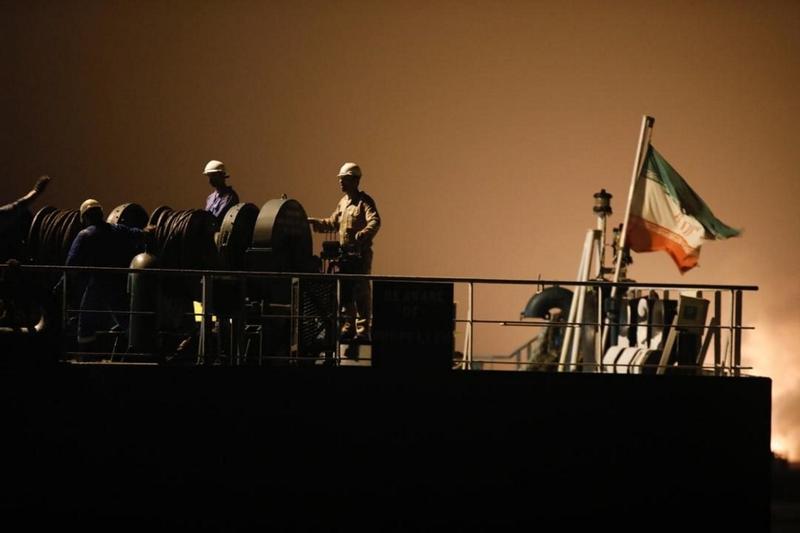 Handout photo released by the Venezuelan Ministry of Popular Power for Communication and Information (Minci) showing the Iranian-flagged oil tanker Fortune arriving at the El Palito refinery in Puerto Cabello, in the northern state of Carabobo, Venezuela, on May 25, 2020. (MINCI / AFP)
Handout photo released by the Venezuelan Ministry of Popular Power for Communication and Information (Minci) showing the Iranian-flagged oil tanker Fortune arriving at the El Palito refinery in Puerto Cabello, in the northern state of Carabobo, Venezuela, on May 25, 2020. (MINCI / AFP)
WASHINGTON - US prosecutors filed a lawsuit to seize the gasoline aboard four tankers that Iran is trying to ship to Venezuela, the latest attempt by the Trump administration to increase economic pressure on the two US foes.
The government of Venezuela’s socialist President Nicolas Maduro has flaunted the fuel supply to show it remains unbowed by US pressure
The government of Venezuela’s socialist President Nicolas Maduro has flaunted the fuel supply to show it remains unbowed by US pressure. Washington has been pressing for Maduro’s ouster with diplomatic and punitive measures, including sanctions on state oil company PDVSA.
The lawsuit, filed late on Wednesday in the US District Court for the District of Columbia, was followed on Thursday by a warrant issued by US District Judge James Boasberg for the seizure of the more than 1.1 million barrels of gasoline in the four vessels.
ALSO READ: Venezuela slams US 'provocation' after navy operation
Legal sources said the gasoline could likely only be seized by US authorities if the tankers enter US territorial waters. But they said the actions could help push other countries to cooperate in seizing the fuel.
Gasoline shortages in Venezuela, like Iran a member of OPEC, have grown acute due to US sanctions, and the country has undergone an economic collapse. Still, Maduro has held on.
In the civil-forfeiture complaint, US federal prosecutors aim to stop delivery of Iranian gasoline aboard the Liberia-flagged Bella, Bering, Pandi and Luna, according to the lawsuit, first reported by the Wall Street Journal.
Boasberg issued the warrant for the seizure of the gasoline in the tankers based on probable cause that the fuel is forfeitable, the Justice Department said.
ALSO READ: US navy ship navigates near Venezuelan coast after Iranian ship arrives
The lawsuit also aims to stop the flow of revenues from oil sales to Iran, which Washington has sanctioned over its nuclear program, ballistic missiles, and influence across the Middle East. Tehran says its nuclear program is for peaceful purposes.
Washington has increasingly been using civil forfeiture to stop illicit trade involving Iran and Venezuela, complementing its sanctions policy, according to Evelyn Sheehan and Beau Barnes at Kobre and Kim, a firm specialized in disputes and investigations.
“US policy towards both Venezuela and Iran is focused on denying both regimes access to foreign currency,” said Sheehan, who is also a former US Department of Justice prosecutor. “Intercepting gasoline cargoes with civil forfeiture is a novel way to achieve that goal.”
Zia Faruqui and two other assistant US attorneys allege in the lawsuit that Iranian businessman Mahmoud Madanipour, affiliated with Iran’s Islamic Revolutionary Guard Corps, or IRGC, helped arrange the shipments by changing documents about the tankers to evade US sanctions.
READ MORE: Iran ship reaches Venezuelan waters with cargo of food
The lawsuit says that since September 2018, the Revolutionary Guards’ elite Quds Force has moved oil through a sanctioned shipping network involving dozens of ship managers, vessels and facilitators.
SHIP-TO-SHIP TRANSFER IN UAE
Profits from the shipments support the “full range of nefarious activities, including the proliferation of weapons of mass destruction and their means of delivery, support for terrorism, and a variety of human rights abuses, at home and abroad,” the lawsuit said.
The vessels carrying Iranian gasoline engaged in ship-to-ship transfers to evade sanctions. The Pandi, for example, engaged in such a transfer in Port Khalid in UAE to load the Iranian gasoline surreptitiously, the lawsuit said.
It was not immediately clear whether or how the Trump administration would move to seize the gasoline. The US government must prove the fuel is forfeitable under law in a civil proceeding for it to seize it permanently.
READ MORE: Venezuela's Maduro defends right to 'freely trade' with Iran
Last year, the Trump administration failed to stop a tanker carrying 2.1 million barrels of Iranian oil, the Adrian Darya formerly known as Grace 1, through blacklisting it and other measures.
The vessel was originally seized by the British Royal Marine commandos on suspicion being en route to Syria, but was released by Gibraltar.
After a warrant was issued for the Adrian Darya, Brian Hook, the State Department’s top Iran official, sent emails to its captain saying the Trump administration was offering him several million dollars to steer the tanker to a country that would impound it on behalf of Washington.
The oil was eventually sold to the Assad government in Syria.


